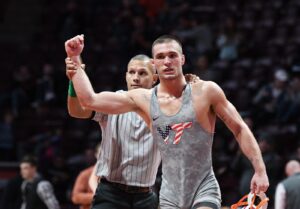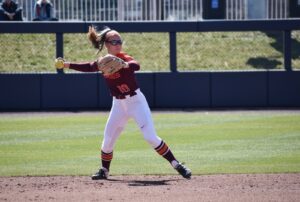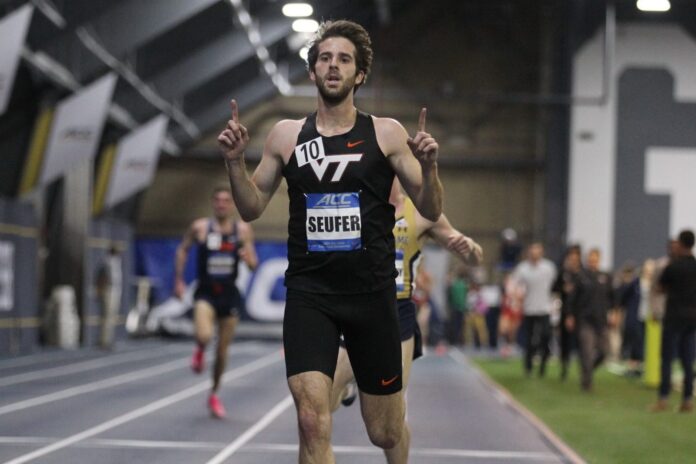The scene is the same at college campuses nationwide. Baseball stadiums are empty, locker rooms are bare, and tracks are deserted. Athletic competitions and practices are at a standstill in the midst of COVID-19.
For some Virginia Tech athletes, this year was the last opportunity to compete for a national wrestling championship, the last chance to showcase their skills before professional scouts, and the last time to wear a maroon and orange jersey.
It also was the first time that these athletes, in the wake of canceled seasons and dashed dreams, could be a part of helping the country battle a global pandemic. It’s a sacrifice that hasn’t gone unnoticed, said Whit Babcock, Virginia Tech’s athletic director.
“We’re exceedingly proud of all of our Virginia Tech student-athletes and coaches for what they were able to accomplish and the way they have responded to these difficult times,” he said. “We continue to support all our athletic programs and we can’t wait until we’re all able to come back to campus together as Hokies.”
Many Hokie athletes are hopeful. Some will return for an added season of eligibility, granted by the NCAA for athletes competing in spring season sports.
Others are making the best of the crisis and moving forward with the next steps in their journey.
A Milestone’s Edge
On March 12, Peter Seufer was at a hotel in Albuquerque, New Mexico, ready to hit the track the next day to compete in the NCAA Indoor Track & Field Championships, his final 3,000- and 5,000-meter races as a Hokie. Two weeks prior to that, Seufer won both races at the ACC Championships, but this was his first time competing at the national indoor meet. Seufer’s mom was on an airplane, headed to Albuquerque from Lynchburg, Virginia, to cheer him on.
Seufer never ran the races.
That day, the championships were canceled, joining a growing list of NCAA events being axed due to COVID-19.
Seufer, a redshirt senior, was alone in his hotel room when he heard the news.
“I sat there and stared out the window a little bit,” he said. “I didn’t really want to respond or talk about it at the moment. It was still sinking in that this was actually happening.”
The race marked the end of Seufer’s running career at Virginia Tech. He would not be competing in the outdoor track and field season, because his eligibility was up.
“This was my very last chance,” said Seufer, who placed fourth in the NCAA Cross Country Championships in November and was the Southeast Region Men’s Track Athlete of the Year for the indoor season. “I had never qualified individually for indoor NCAA’s. This was my last time wearing the Virginia Tech jersey. I was more ready than ever to compete on the national stage.”
Since returning to Blacksburg, Seufer is settling into a routine of online classes and running twice a day. Although he still asks himself “what if” questions, Seufer has accepted the reason that the indoor championship was canceled.
“In the grand scheme of things, there are much bigger things going right now,” he said. “It is the right decision ultimately.”
Seufer planned to run in the now-postponed Olympic Trials this summer, and he still hopes to qualify for the trials in the 5K or the 10K when the races are rescheduled.
Future competitions are just one unknown for Seufer, however. The finance and economics major has a full-time consulting position lined up at PricewaterhouseCoopers in New York City after graduation. Because of COVID-19, his start date is uncertain.
Final mountaintop climb derailed

David McFadden should have spent the middle of March wrestling for a national championship.
Instead, the pandemic left the three-time All-American pinned down at his New Jersey home grappling with a premature ending to his athletic career.
“It hit me like a brick wall,” said McFadden, a redshirt senior, about the abrupt ending. “I feel for every wrestler and every athlete in the country.”
On March 12, just a week prior to the top Division I collegiate wrestling event in the nation, the NCAA canceled its remaining championships for the 2020 winter and spring seasons. Five days later, the ACC followed suit, shutting down all athletic activities for the remainder of the 2019-20 academic year.
“You hear about ‘American Pie,’ you know, the day the music died. Well, that was the day the sports world stopped in its tracks,” McFadden said. “I just kind of broke down and we [the wrestling team] just all kind of came together and hugged. It was a really hard moment for all of us.”
A two-time ACC champion, McFadden was slated as a seventh seed for the NCAA tournament and had a very realistic shot at becoming Virginia Tech’s first four-time All-American.
“I wanted to win the whole dang thing, but life goes on,” he said in April from his family’s home in West Milford, New Jersey, where he’s finishing his degree in human development online.
McFadden was later named an All-American based on his body of work through season and conference championships. The honor is traditionally given based on performances at the NCAA Championships.
McFadden was a two-time New Jersey high school state champion when he decided he’d be most happy to spend his college years as a Hokie.
“It was the culture and the people at Virginia Tech,” he said. “I was really drawn to how tight the community is.”
In Blacksburg, McFadden quickly made his mark, being named the 2016 ACC Freshman of the Year and qualifying for the NCAA tournament in each of his four healthy seasons. He took a medical redshirt during the 2016-17 season with a torn ACL.
Though not the desired ending to his Virginia Tech career, McFadden said he found a measure of closure in his plans to continue to be involved with wrestling, either by competing internationally or coaching.
He said he took advantage of the rare opportunity to visit his family during the school year. Via online courses, he’ll finish the semester living in what’s considered a COVID-19 “hot zone,” which has added a bit of perspective to his situation.
“Up here, people are sometimes losing their lives within like three hours of being diagnosed. So hearing from family friends who are nurses and doctors and people who are losing family members, it really puts it in perspective. What we’re going through isn’t really that big of a deal,” McFadden said.
He encouraged fellow Hokies to continue to do their parts in fighting the pandemic and have faith that a silver lining will one day be revealed.
“You know, there’s a lot worse things than missing a party or something, and this thing is really serious,” McFadden said. “But I have a feeling that something good is going to eventually come out of all this. It just has to.”
History Unmade

It was a dream season, the team’s best in 14 years. Breaking record after record, the Virginia Tech women’s basketball team ended the regular season with 21 wins and only nine losses. They had high hopes for a spot in the NCAA Tournament.
No one was more excited than Taja Cole. The graduate transfer and starting point guard was looking to cap her final year of collegiate basketball with a bang. Leading the Hokies to the NCAA Tournament would be a defining accomplishment for the program and allow her to make her mark.
Cole was home in Richmond, Virginia, for spring break when she heard that the NCAA Tournament was canceled. She said she had a feeling that the decision may be coming. That didn’t make the news any easier.
Still, Cole, who called her coach immediately after hearing the news, knew she needed to encourage her teammates.
“It’s unfortunate that we didn’t get the chance to finish, but our success still stands,” said Cole, who was fifth in the nation in assists. “This year is a year we will remember forever. I have a lot of confidence that this next group will exhibit great leadership and continue the new culture we built.”
This kind of leadership is common for Cole, who is known for keeping her teammates’ interests in front of her mind.
“I always try to tell them that this game of basketball is bigger than just us,” she said. “My job as a point guard is easy because I don’t put a lot of pressure in thinking about myself. I think about how I can make you a better player, or make you smile today.”
Cole, who practices basketball each day at her own gym with two full courts, has her sights set on playing the game professionally. It has been her dream since she was a child. Once she graduates in May, she hopes to play with a professional league overseas and get a shot with the Women’s National Basketball Association.
Basketball “teaches you so much about life,” said Cole, who will graduate from Virginia Tech with a master’s degree in leadership studies. “You going through adversity on the court and having to figure it out in that moment is the same thing you’re going to have to do in life.”
Embracing an extension

Like many Division I senior athletes, Jaison Heard was banking on his final Virginia Tech baseball season to help him reach his goals. The relief pitcher from Florida dreamed of playing for a Major League Baseball team. This season would be his final opportunity to prove that he was ready for a professional baseball career.
As of mid-March, the Hokies had played 17 games, and things were going well for Heard. The team was preparing for a game in Blacksburg against the University of Miami on March 13. That game was canceled, and the next day, the players received the official word from their coaches — the season was canceled because of COVID-19.
“I was speechless at first,” said Heard. “Then, I went back to my apartment and it started to set in. I cried.
“All of a sudden it seemed like in the blink of an eye, everything was just gone,” he said.
Heard couldn’t bear to leave Blacksburg right away, so he stayed for a few more days before heading home to Maitland, Florida. There, he would finish his spring semester courses online, keep playing baseball, and await the final decision on another important question — would the NCAA and the Atlantic Coast Conference grant spring athletes an extra year of eligibility?
In the midst of the crisis, Heard has been FaceTiming with his teammates and participating in Zoom meetings with the pitching crew.
Earlier this month, Heard learned that he will get another shot at his senior season. Unless he is drafted this summer, Heard can return to Blacksburg for the 2020-21 winter and spring baseball season, receiving an extra year of eligibility and the continuation of his scholarship.
“I was definitely excited to have that option,” said Heard, a business management major who plans to graduate in December. “The ultimate goal is to play for as long as I can and as long as I have a love for the game.”
Season Disrupted Deja Vu

Olivia Lattin defied medical odds in fighting back a season-ending injury last spring to ensure herself a full schedule this year.
Unfortunately the redshirt senior had to trade in her comeback for a role in the fight against COVID-19.
“They told me it would take eight to nine months to get back. It took me six,” said Lattin, who suffered a torn ACL in February 2019. “I just worked my butt off, and to have it all ripped out from under me, that was just utter disappointment.”
A first-team, all-state player from Kingston, New York, Lattin said a visit to Blacksburg set the standard during her college selection process.
“Virginia Tech was the first school I visited in the ACC, and I started comparing every other school to it,” said the Hokies infielder. “I just love it there.”
Lattin was a starter each season as a Hokie and posted a better than .900 fielding percentage in every season. Last spring, her season was cut short when she was hurt during a collision at first base.
This year, the team was on pace for their best season since Lattin came to Virginia Tech when announcements of canceled seasons began, first the NCAA, then the ACC.
“There was a lot of uncertainty at first, but then they were like, you know you can go home if you want, and I thought I might as well for a little bit because I’m never home at this time of year,” Lattin said.
Once at home, It wasn’t long before she realized returning to Blacksburg would be irresponsible of her.
“Once things started to get bad here [with the outbreak], I thought, ‘Oh my God, I might have it now. I can’t go back now,’” Lattin said. “Thankfully, I don’t have it, and no one in my family does right now either.”
Although she is disappointed about another lost season, Lattin said she’s learned a lot from the experience.
“This has happened to me twice now, and it just teaches you that you have to enjoy every moment and never take anything for granted,” she said.
Lattin finished a degree in finance in 2019 and will earn another in management in May. She said she’s currently trying to decide whether to accept an extra season of eligibility and return to Virginia Tech or to move on and enter the workforce.
“Regardless, I would love to be able to still be in Virginia. I love Southwest Virginia,” Lattin said.
– Jenny Kincaid Boone and Travis Williams

